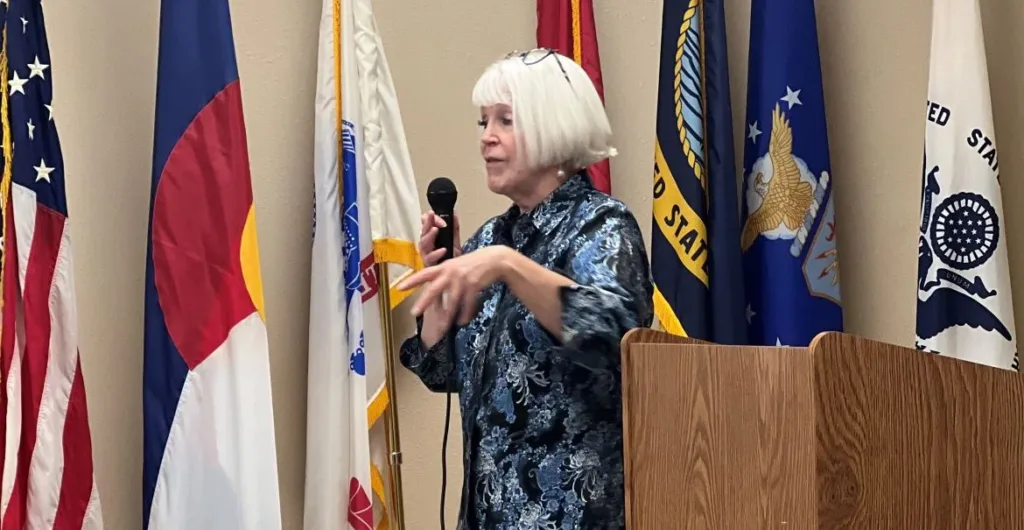October 30, 2025, is the National Day of Remembrance for Nuclear Weapons Program Workers, honoring the men and women who protected U.S. security from WWII through today—often in hazardous, secretive conditions. According to the US Department of Energy, the day also marks the October 30, 2000, signing of the Energy Employees Occupational Illness Compensation Program Act or EEOICPA, a landmark law recognizing nuclear workers’ sacrifices and providing medical benefits and compensation for work-related illnesses.
To commemorate this observance, we interviewed a former nuclear worker Judy Padilla, who told us about her long career where she served the United States as a nuclear worker at the Rocky Flats Plant in Golden, Colorado. Working in the nuclear field for over two decades, Judy’s story is one of groundbreaking skill, deep camaraderie and a personal battle that began long after her shifts ended. It’s a powerful reminder of the human side of the nuclear industry and the enduring strength of those who powered it.
Background and beginnings
In the early 1980s, opportunities for women in specialized industrial fields were still scarce. Judy Padilla, however, was an exception. Armed with a rare skill set, she found herself at a professional crossroads with a choice between two very different paths.
“I was one of the few women skilled in metallurgy at the time and accepted a well-paying position at the Rocky Flats Plant, over another job where I would’ve just been braiding wires at a table for AT&T,” Judy recalls. The decision led her into the heart of America’s nuclear complex, where she would contribute to national security efforts from 1982 to 2005.
Life at Rocky Flats
Judy’s role placed her on the front lines of nuclear production. As a Metallurgical Operator, her daily routine was anything but ordinary. It involved precision, focus and working with some of the most volatile materials on earth.
“I spent my typical day in the glove box melting plutonium at 1,200 degrees Fahrenheit,” Judy explains. Although the work was highly specialized and hazardous, the plant’s environment was shaped by more than just the tasks. For Judy, the most memorable part of her long career was the people she worked alongside.
The intense nature of their jobs forged powerful connections among the workers. Judy says her fellow workers felt like brothers and sisters and were what she enjoyed most about the job. This sense of family created a supportive community within the high security walls of the plant, a bond that would become even more important in the years to come.
Health and illness
After years of dedicated service, Judy’s life took an unexpected and difficult turn. The connection between her health and her work became painfully clear. “Fifteen years into my career at Rocky Flats, in 1998, I was diagnosed with breast cancer,” she says.
The diagnosis marked the beginning of a new and arduous chapter. While Judy has overcome the immediate battle with the disease, the consequences of the illness and its treatment remain a part of her everyday reality. “I’m in remission, but the long-term effects of the treatment have impacted some of my daily activities,” Judy shares. Her experience highlights the hidden, long-term sacrifices made by many nuclear workers, whose health challenges often emerge years after their initial exposure.
Awareness and advocacy
Judy’s personal health journey transformed her into a passionate advocate for her fellow nuclear workers. She believes there is a critical lack of understanding about the occupational hazards they face. When asked what she wishes more people understood, her answer is direct: the effects of radiation exposure.
She feels a profound responsibility to speak out, not just for herself but for the entire community of workers who have suffered in silence. Sharing these personal histories is a vital step toward broader recognition and change. Events like National Nuclear Worker Day play an essential role in this effort. For Judy, its purpose is clear: helping raise awareness about the health effects of working around nuclear materials. By giving a platform to stories like hers, these moments of recognition can help educate the public and honor the sacrifices made behind the scenes.
Recognition and legacy
Despite the immense contributions nuclear workers have made to national security, Judy believes society has failed to adequately acknowledge their sacrifices and properly recognize those who have become ill.
This lack of recognition is a deep source of pain for many families. Judy urges leaders and communities to provide tangible support for those who have been left behind. She would like to see more recognition or compensation to the families who have lost their loved ones because of a work-related illness. “I know too many families that have received nothing or been denied,” says Judy.
Her advice for anyone considering a career in the nuclear field is born from her own experience. She urges them to be proactive and informed. “Do your own research of what you’re exposing yourself to and consider if your government is going to protect you when you become ill,” she advises. “It is a call for empowerment through knowledge.”
Looking back
Judy Padilla’s journey from metallurgist to advocate highlights her resilience and commitment to justice beyond the job. She urges nuclear workers who have become ill from their jobs to keep pushing forward and advocate for themselves.
Maxim Healthcare thanks Judy and all energy workers for their sacrifice. We offer extensive home health and personal care services to the energy workers community. To learn more about the services available near you, contact your local Maxim office. You’ve served us; now let us serve you.

